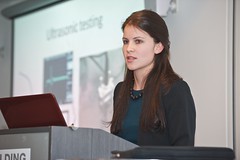The University of Reading's Graduate School Bulletin (November 2014) featured an interview with Dr Marek Kubik, one of the first graduates from the university's Technologies for Sustainable Built Environments (TSBE) Centre.
A PROFESSIONAL DOCTORATE... but what comes next?Marek Kubik graduated from the University this summer with an Engineering Doctorate (EngD), from the Technologies for Sustainable Built Environments (TSBE) Centre.
The TSBE is an industrial Doctoral Training Centre for construction technology, climate and business enterprise research and was established in 2009 with a £6 million grant from the Engineering and Physical Sciences Research Council (EPSRC). Marek followed a four year programme instead of the traditional three year PhD; which included an industry based research project and University taught modules relevant to the project. He was sponsored by AES, a global power company, supported by two academic supervisors and spent a significant amount of time based in industry.
What have you been doing since you graduated?
I took up an advisory position in AES, the company I completed my doctorate with, reporting directly to the Vice President for UK & Ireland. I have responsibility for mapping a route to market for energy storage, something that follows neatly on from my research.
Recently, I successfully led a bid through the first round of Innovate UK funding to support a $6.6m 10MW battery storage project in Northern Ireland (the largest of its kind in Europe). I am also organising a high profile energy storage seminar hosted by the All Party Group at Stormont, Northern Ireland’s Parliament.
Was there anything you did at Reading that you feel has helped you in your new position?
The supportive attitude of the TSBE Centre to pursue career development opportunities, such as my secondment in UK Parliament, teaching STEM (Science, Technology, Engineering and Mathematics) in local schools and Henley Business School mentoring was very valuable. The Graduate School was a useful entity, both in terms of facilities and in networking outside my immediate research group.
Why did you select Reading?
I chose to undertake an EngD at Reading as I wanted a project with strong links to industry and that focused on an immediate industry challenge in the field of sustainability. Working for both the University and my industry sponsor has allowed me to gain invaluable experience, which I believe is the single most important factor in gaining employment post completion.
What was your biggest challenge during your studies?
The biggest challenge was managing the divergent expectations of academia and industry, and keeping both sides happy with the scope and nature of my research. The EngD programme requires delivery on both fronts; the full academic rigor and contribution to knowledge of a PhD, but with added industrial impact and relevance.
Knowing what you know now, what advice would you give a new 1st year doctoral researcher?
My first piece of advice is to publish early. Publishing international conference papers and journal papers helps hone your writing ability and gives you material that can be readily dropped into your thesis. Second, plan ahead. Your time shoots by and you need to factor in writing-up time. I began dedicating a couple of days a month to start writing up 18 months ahead of submission. Finally, enjoy it. It is unlikely you will ever again get the opportunity to have as much flexibility to work in an area and to really think about how to solve the challenges your field faces.
And finally, where do you want to be in 5 years?
I would like to be in a position where I can look back and be proud of delivering the change urgently needed in the energy sector. I want to see ‘us’ on a trajectory of avoiding catastrophic climate change and relieve energy poverty where it exists.






